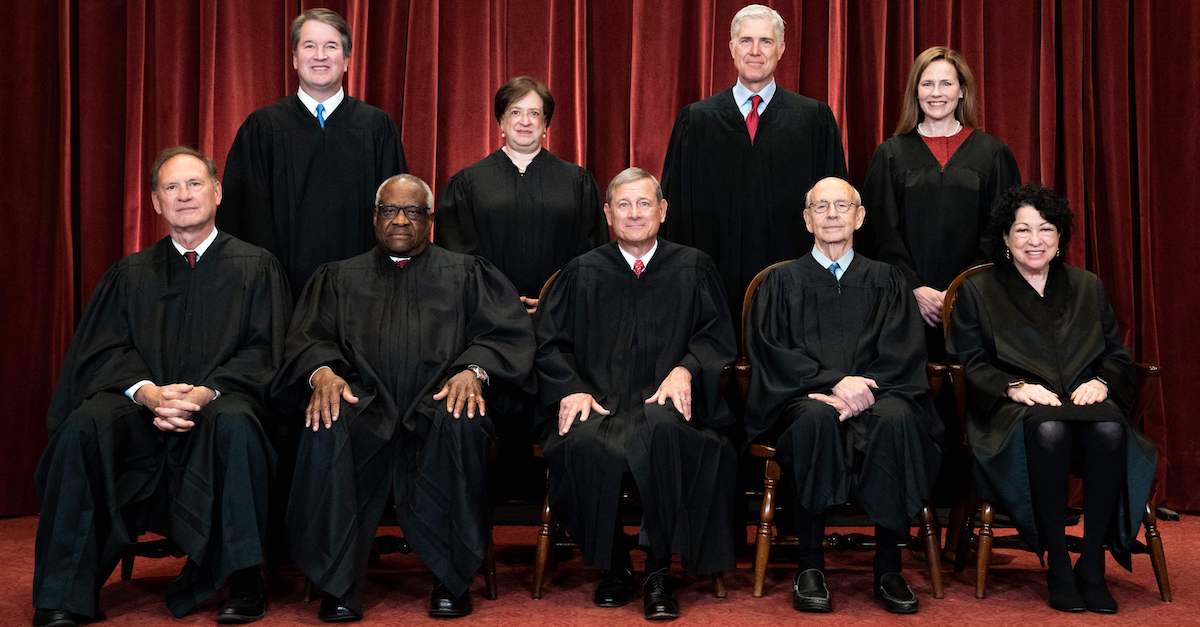
The Supreme Court of the United States heard oral arguments on Wednesday in United States v. Tsarnaev, a case involving the Biden administration’s request that SCOTUS reinstate a death sentence for Boston Marathon bomber Dzhokhar Tsarnaev. The case is an unusual example of what some in the legal community have called “cognitive dissonance,” in which the Biden administration is advocating a position that is in clear conflict with its stated policy goals.
A bit of cognitive dissonance at the high court today https://t.co/PLSHZo3Hun
— Steven Mazie (@stevenmazie) October 13, 2021
Biden pledged to end the death penalty, and called for a moratorium on all federal executions — a position that stands in stark contrast to the multiple federal executions carried out in the final days of the Trump administration. In the case before SCOTUS, however, the Department of Justice maintains that the justices should reinstate the death penalty thrown out by the federal appellate court.
Tsarnaev was tried for his role in the 2013 bombings which killed three people and injured hundreds of others. At the 2015 trial, Tsarnaev admitted to taking part in the bombing, but argued that he had been heavily influenced by his brother Tamerlan Tsarnaev, who died while fleeing police after the bombing. A jury found Dzhokhar Tsarnaev guilty, and sentenced him to death.
The U.S. Court of Appeals for the First Circuit reversed Tsarnaev’s death sentence on two separate grounds. First, the appellate court ruled that the trial court should have questioned potential jurors about their media exposure to the case, and excluded those jurors who had been unfairly exposed.
Second, the First Circuit ruled that Tsarnaev should have been permitted to include evidence about his brother’s involvement in an unrelated unsolved triple murder in 2011 that took place in Waltham, Massachusetts. The appellate court agreed with the defendant’s argument that Tamerlan’s violent history constituted relevant mitigating evidence about the kind of influence he exerted over his brother.
The Supreme Court focused the majority of its 90-minute oral arguments on whether the evidence of Tamerlan Tsarnaev’s involvement in the Waltham murders should have been admitted at the penalty phase and, if so, whether that error justified the First Circuit’s reversal of Tsarnaev’s death sentence.
Justice Elena Kagan pressed Deputy Solicitor General Eric Feigin at length on the government’s position, remarking that evidence of Tamerlan’s involvement in the Waltham murders “clearly goes to a mitigating factor” regarding his influence over his brother.
Justice Stephen Breyer went a step beyond, pointing out that the federal government relied on evidence of Tamerlan’s past criminal history as the basis for obtaining a search warrant, but now argues that the same evidence is improper in the context of a death sentence.
“If the government thinks it is enough to show probable cause for a car search, isn’t it enough to get into a death case?” Breyer asked. The justice, who recently called for the high court to rethink the death penalty, ended by underscoring the unusual nature of the government’s position: “When was the last time there was an execution in Massachusetts?”
“This is a constitutional issue,” said Justice Sonia Sotomayor, a frequent critic of the death penalty. “I don’t know of any other situation where you can deny a defendant a constitutional right on a simple weighing,” the justice continued, referencing the government’s position that the evidence in question was not reliable enough to be admitted.
Justice Kagan chimed in again, calling Tamerlan Tsarnaev’s influence over Dzhokhar Tsarnaev “the entire case.”
“And yet,” Kagan remarked incredulously, “the court keeps out evidence that the older brother committed three murders?”
It was Justice Amy Coney Barrett, however, who addressed the elephant in the room: Why is the Biden Administration arguing in favor of reinstating a death sentence when it has called a moratorium on federal executions generally?
“Mr Feigin, I’m wondering what the government’s endgame is here,” Barrett asked pointedly. “So the government has declared a moratorium on executions, but you’re here defending his death sentences,” she continued. “And if you win,” Barrett went on, “presumably that means that he is relegated to living under threat of a death sentence that the government doesn’t plan to carry out.”
“So I’m having trouble following the point,” she quipped.
The government argued that the jury’s verdict should be respected despite the court’s refusal to admit evidence about the Waltham murders, particularly in a case of brutal terrorism.
[image via Erin Schaff/POOL/AFP via Getty Images]
Have a tip we should know? [email protected]